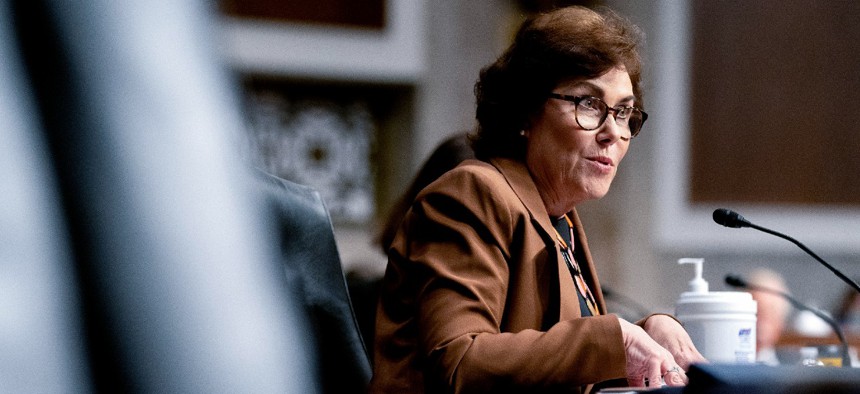
Sen. Jacky Rosen, D-Nev., praised the MSPB nominees for their experience in federal workforce issues. Stefani Reynolds/The New York Times via AP, Pool
Federal Employee Appeals Board Now One Step Closer to Ending Years-Long Dysfunction
Biden's nominees to the Merit Systems Protection Board are now heading to the full Senate for a vote.
A Senate committee has advanced President Biden’s nominees to serve on the panel tasked with enforcing civil service protections, moving one step closer to ending years of dysfunction at the agency.
Cathy Harris, Biden's nominee to be chairwoman of the Merit Systems Protection Board; Tristan Leavitt; and Ray Limon, were all approved by the Senate Homeland Security and Governmental Affairs Committee on Wednesday. MSPB's central board has been completely vacant since early 2019. It has not had a quorum since January 2017, which has prevented it from ruling on cases appealed by employees or agencies after initial decisions by administrative judges. There is now a backlog of 3,400 such cases awaiting the board once the nominees receive final confirmation from the Senate.
While lawmakers in both parties have decried the lack of a central board and called for nominees to fill the posts, Wednesday’s vote was not without some drama. Republicans objected to Harris’ nomination, saying the attorney with extensive experience in federal workforce law had not demonstrated she could objectively chair the board. During her confirmation hearing last month, Sens. Rob Portman, R-Ohio, and Josh Hawley, R-Mo., asked Harris about her history of posting partisan tweets disparaging some conservatives. Harris apologized for some of those messages and promised to take a non-partisan approach in her role at MSPB.
“We have to treat each federal employee that comes before MSPB the same and through her very partisan statements, Ms. Harris has generated doubt as to whether she can meet that standard,” Portman said on Wednesday before announcing he would not support her.
Still, the committee approved Harris along party lines. Limon and Leavitt both won bipartisan support; Leavitt is a Republican nominee.
Sen. Jacky Rosen, D-Nev., lamented that many cases have been pending before MSPB for years and praised the nominees for their experience in federal workforce issues. Limon is currently a human resources official at the Interior Department and Leavitt has served as general counsel at MSPB and as the agency’s de facto head ever since the board became vacant.
“All three nominees are well qualified and bring significant experience,” Rosen said. “They’re ready to work together to tackle the challenge before MSPB head on.”
The nominees last month pledged to work quickly to address the case backlog, promising a "triage system" to address the most pressing cases first. They plan to issue "short orders," where they can move quickly without offering much in the way of explanations, and said they hoped half of the backlogged cases could be settled.
In addition to the backlog, the nominees can expect challenges ahead from the all-but-certain case surge related to terminations from federal employees who refuse to comply with Biden’s COVID-19 vaccine mandate. They said during their confirmation hearing they would review guidance from the Office of Personnel Management and ensure the terminations were within reason.
MSPB has said it is anticipating an uptick in appeals originating from other elements of the COVID-19 pandemic as well, noting it could lead to prohibited personnel practices resulting from policies over telework eligibility, returning to offices and safety protocols.
Additionally, toward the end of the Trump administration, agencies—citing a 2018 Supreme Court ruling—began arguing the board's administrative judges did not have the authority to rule on cases due to the manner in which they were appointed. Some judges, citing the lack of guidance from MSPB's non-existent central board, have punted on issuing a ruling on those cases until a federal court could intervene. A potentially landmark case that could uproot the legitimacy of all of MSPB’s administrative judges is currently pending, with a ruling expected in the coming months.







